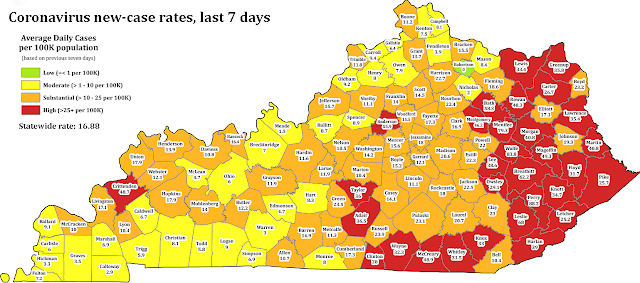Covid-19 metrics in Kentucky continue to decline, but deaths from the disease remain high and vaccination rates are still low

Daily state Dept. for Public Health map, adapted by Ky. Health News; for a larger version, click on it.
For the latest weekly map showing risk of hospitalization, suggesting masking practices, click here.
—–
By Melissa Patrick and Al Cross
Kentucky Health News
As Kentucky moved to weekly reporting of Covid-19 measurements, signaling a new phase of the pandemic, Gov. Andy Beshear said “All the trends are headed in the right direction, except for vaccination.”
Covid-19 deaths are still slowly rising, but they are a lagging indicator of the pandemic, and Beshear has said he expects them to start falling soon.
Kentucky saw a 3% drop in Covid-19 vaccinations week to week, with an average of 2,835 doses per day last week, The Washington Post reports.
The state’s latest weekly pandemic report suggested that the fall in new cases was slowing, perhaps even hitting a plateau, but Beshear attributed that to a lag in testing and reporting around the Presidents’ Day holiday, which pushed cases into the most recently reported week.
“We do not believe that we are at any plateau,” Beshear said, “but we will only know if we hit one when we see it over the course of a couple of weeks.” He said a better indicator is the percentage of people testing positive for the coronavirus, which dropped to 6.04% in the Monday-to-Sunday reporting week.
 |
| Dept. for Public Health graph, adapted by Kentucky Health News; to enlarge, click on it. |
In that week, the state reported 12,010 new virus cases, down from 13,305 in the prior report. This is the sixth consecutive week of decline for both metrics.
“Our hope certainly is this next week you will continue to see a larger decline,” Beshear said.
In the same week, Kentucky attributed 275 more deaths to Covid-19, up from 196 in the prior week.
Kentucky’s Covid-19 hospital numbers keep falling, but the hospitalization rate remains third in the nation and its new-case rate is fifth, according to federal data processed by The New York Times. Beshear said Kentucky’s Omicron surge peaked later than most states, so its recovery is later.
Kentucky hospitals report having 652 patients with Covid-19, with 148 in intensive care and 88 on mechanical ventilation. Beshear noted that those numbers are below the level found between the end of the Delta surge and the beginning of the Omicron surge in late June.
“It feels a lot like last summer,” Health Commissioner Steven Stack said at Beshear’s weekly Covid-19 press conference. Beshear said that if the numbers “continue to decline at a steady rate, he would “pause” the weekly events.
“The last time I said we were going to stop it, we had another variant that flared up,” he said. That was Omicron, the most contagious variant proven yet.
Asked the odds that another such variant will arise, Stack said, “All of our crystal balls are cloudy” because most people in the world are not vaccinated against the virus and there are Kentucky counties with only one-third of residents vaccinated, “so there’s abundant opportunity for mutations to arise.”
But the pandemic has clearly entered a new phase, as Kentucky joins most other states in shifting to weekly reports. Stack said daily reports no longer “reasonably inform” prevention decisions by individuals and governments.
While the state and the Centers for Disease Control and Prevention have adopted a new map to better show the risk of infection, the state Covid-19 website continues to offer a map with a daily update of the seven-day infection rate by county. On Monday, the rate was 16.88 daily cases per 100,000 residents, far below the top 237/100K rate recorded Jan. 21.
Stack said the CDC would release data and a community-level map late on Thursdays and the state would update its version of the map on Fridays. Weekly data reports will be posted on Mondays.
The new map drops the color orange, using only red, yellow and green to show risk, based more on hospital data than new-case data. Eight counties are in green, 47 are in yellow and 51 are in red, a zone in which mask wearing is still recommended in indoor public spaces.
Beshear said he expects more Kentucky counties will move into the yellow zone next week, but cautioned that decision-makers on masking in schools should remember that children spend hours at a time in close quarters, often with poor ventilation, among a population with low vaccination rates.
Asked for his mask advice to the general public, Beshear said, “The No. 1 piece of advice I can give is, don’t feel pressure.” He said people should consider their daily activities and the infection level in their county, and those with pre-existing conditions should wear one because “there is still a lot of Omicron out there.”
Stack said, “We are in a phase now where with vaccines, with therapies, with abundant access to testing and with all the information we know about this disease, that we can hopefully now take individual responsibility in a different way and enable people to have more flexibilities in how they live their lives.”
Asked to elaborate, he said “It’s about taking focused steps to protect those who would get severely hurt by it, while the rest of us move on and can do more of the activities we used to do and for all of us to feel comfortable in doing those things.”
Beshear reminded Kentuckians that they can order four additional free at-home rapid antigen at-home tests at covidtests.gov.